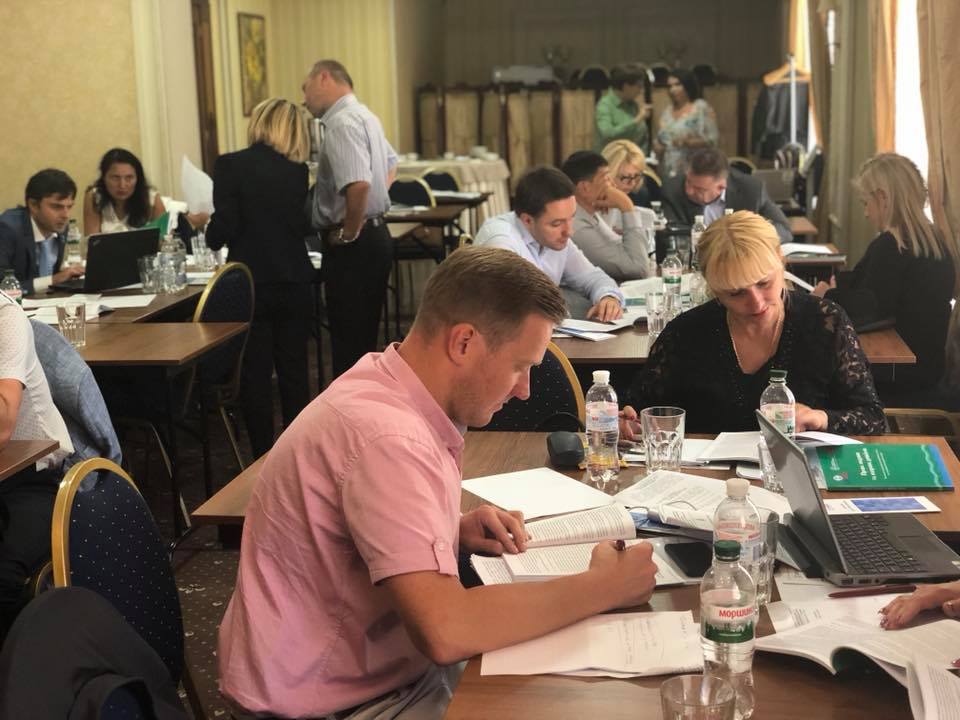The project “Effective Justice for Protection of the Environment and Environmental Rights of Citizens” that was implemented for a year supported by the Nove Pravosuddya Justice Sector Reform Program financed by the United States Agency for International Development (USAID), is coming to an end.

During this time, a distance course “Human Rights and Environmental Protection” was developed and approbated, one course manual for trainers of the course was published, 2 meetings of the course developers and 4 trainings for judges were conducted. In total, 100 judges as well as 6 teachers of the distance course were trained.

The trainings were held in Lviv, Chernivtsi and Odesa, which allowed to cover the territory of all Ukraine. The judges were from all regions. In addition to the practical part, the participants visited the Dniester River at the site of the planned construction of a cascade of 6 hydro power plants. In Odessa judges analyzed the problems with sewage water purification system in Ovidiopolsky district, as well as the problems of Hadzhibey estuary contamination.
On September 12-13, 2018, the final training “Human Rights and Environmental Protection” was held in Lviv. This time, the training gathered 30 judges. In addition to representatives of the judiciary, the training was also attended by the Legal and Judicial Training Specialist of USAID Nove Pravosuddya Justice Sector Reform Program Iryna Zaretska, Director of the Lviv Regional Branch of the National School of Judges Oksana Polna, the teacher-coordinator of the department of training teachers at the National School of Judges of Ukraine Oleksandr Potilchak, Advisor to the Head of the State Judicial Administration of Ukraine, member of the Executive Board of the International charitable organization “Environment-People-Law” Iryna Voytiuk, teacher-coordinator of the department of training teachers at the National School of Judges of Ukraine Tamara Zakrevska.
The final training was delivered by experienced judges Larysa Zuyeva from Odessa Appelate Administrative Court, Natalia Kuriy, a judge from Lviv Appelate Court, Volodymyr Hevko, a judge of Ternopil Economic Court, and Serhiy Pavlinchuk, a judge of Novoselytsky District Court in Chernivtsi Oblast.
During the training, the participants worked on the four modules of the distance course “Human Rights and Environmental Protection”. In particular, they analyzed the practice of the European Court of Human Rights and the relationship between human rights and the environment, learned about various aspects of protection of environmental human rights through the Aarhus Convention, access to justice in environmental matters, and application of effective remedies and a court injunction. The distance course can be found at http://sdn.nsj.gov.ua/.
By order of the vice-rector of the National School of Judges of Ukraine A.V. Kostenko of September 4, 2018, changes were made to the calendar plan of distance training of judges with the aim of raising their level of qualification in 2018 and the course “Human Rights and Environmental Protection” was included in the curriculum for judges. The distance course starts on September 15, 2018.
During the training, an interactive role-playing game was conducted, where judges were able to try themselves in the role of representatives of civil society organizations as plaintiffs, ordinary citizens, defendants and other parties to the process. The results of the training were positively evaluated by both judges-trainers and judge-trainees. The judge of Lviv Regional Administrative Court Oksana Karpyak noted that the course was very knowledge enriching, in particular regarding the application of the Aarhus Convention. In her opinion, practical tasks were very interesting. It was important to learn about the decision of the European Court of Human Rights in the context of protecting environmental human rights.
Marian Kushneryk, a judge of Lviv Appellate Administrative Court, believes that the topic of the training is the most noble among those trainings that he has attended. According to him, the topic is striking by its relevance and can not leave indifferent any participant, be it a judge or a citizen.
Judges-trainees noted that the topic was new to them because they do not often have cases related to environmental issues. Awareness of judges as for the Aarhus Convention and its application in their decisions will enhance the efficiency of the judicial system for protection of environmental human rights and the environment. It also gives hopes for dissemination of the latest trends in environmental law development in Ukraine and in the world, for improvement of the jurisprudence in the area of environmental protection and ensuring proper judicial protection of environmental rights of Ukrainian citizens.

